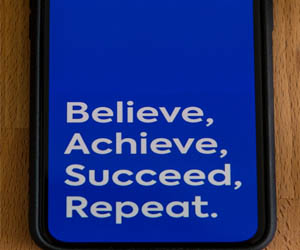


The Art Of Fulfillment And Achievement

What does it mean to lead a life of successful living? Is it defined by financial prosperity, professional accomplishments, or personal contentment? The answer may vary from person to person, but at its core, successful living is about achieving a state of well-rounded fulfillment that encompasses various aspects of life. In this article, we'll delve into the multifaceted concept of successful living and explore key principles that can guide us towards a more gratifying and purpose-driven existence.
Defining Successful Living:
Successful living goes beyond traditional markers of success. While financial stability, career achievements, and material possessions are important, they are just a part of the equation. True success involves a harmonious balance between different domains of life, including:
Career And Financial Success: Achieving your professional goals, financial stability, and pursuing a career that aligns with your passions.
Personal Growth And Well-Being: Nurturing your physical, mental, and emotional health, continuous self-improvement, and personal fulfillment.
Relationships And Connections: Building and maintaining meaningful relationships with family, friends, and significant others.
Giving Back: Contributing to the community or a cause, and finding purpose in making a positive impact on the world.
Key Principles Of Successful Living:
Setting Meaningful Goals: Define clear and meaningful goals in all areas of life, whether they are related to your career, personal growth, or relationships. Having a purpose and direction is essential for successful living.
Balancing Priorities: Successful living requires a delicate balance between different aspects of life. Devote time and energy to your career, but also make room for personal growth, nurturing relationships, and giving back to society.
Continuous Learning: Embrace lifelong learning and personal growth. Expanding your knowledge, skills, and experiences is essential for personal development and success.
Well-Being And Self-Care: Prioritize your physical and mental health. A strong foundation of well-being is crucial for achieving your goals and maintaining a high quality of life.
Cultivating Relationships: Foster healthy and supportive relationships. Surrounding yourself with positive influences can provide emotional support and enrich your life.
Resilience And Adaptability: Life is full of challenges and setbacks. Embrace resilience and adaptability as tools to overcome obstacles and continue progressing.
Measuring Success By Your Own Standards: The path to successful living is a highly individual one. What may be success for one person may not hold the same meaning for another. It's essential to define success on your terms, based on your values, desires, and beliefs.
Successful living is a holistic concept that transcends material wealth and professional achievements. It encompasses personal growth, nurturing relationships, giving back to the community, and achieving a harmonious balance between different aspects of life. Ultimately, successful living is about finding fulfillment, purpose, and contentment in every facet of your existence. It's an ongoing journey that invites you to explore, adapt, and evolve in pursuit of your unique vision of a successful life.
Building Stronger Relationships And Fostering Understanding
 Improved Communication: Resolving conflicts requires active and empathetic listening. It promotes clear and open communication, which is fundamental for understanding each other's perspectives.
Improved Communication: Resolving conflicts requires active and empathetic listening. It promotes clear and open communication, which is fundamental for understanding each other's perspectives.
Preservation Of Relationships: Conflicts left unresolved can damage relationships. Addressing issues allows both parties to move forward and maintain healthy connections.
Increased Self-Awareness: Conflict resolution can help individuals understand their own triggers and responses, leading to personal growth and self-awareness.
Enhanced Problem-Solving Skills: The process of conflict resolution encourages problem-solving and collaboration, leading to better solutions and outcomes.
Benefits Of Effective Conflict Resolution:
Reduced Stress: Resolving conflicts alleviates the emotional burden that conflicts can impose, leading to reduced stress and anxiety.
Stronger Relationships: When conflicts are addressed constructively, relationships can strengthen, as individuals feel heard and understood.
Positive Work Environment: In professional settings, effective conflict resolution can create a positive work environment, leading to increased productivity and job satisfaction.
Personal Growth: Addressing conflicts fosters personal growth as individuals learn to manage emotions and communicate more effectively.
Strategies For Effective Conflict Resolution:
Stay Calm: Keep your emotions in check. Avoid reacting impulsively, as emotional reactions can escalate conflicts.






Introverts' Need For Quiet Reflection And Solitude
 The Sanctuary Of Solitude: Introverts have an innate need for solitude, which is not to be confused with loneliness or isolation. Instead, solitude is a conscious choice to step away from external stimuli and immerse oneself in the sanctuary of one's own thoughts. It is during these moments that introverts can recharge their mental and emotional batteries.
The Sanctuary Of Solitude: Introverts have an innate need for solitude, which is not to be confused with loneliness or isolation. Instead, solitude is a conscious choice to step away from external stimuli and immerse oneself in the sanctuary of one's own thoughts. It is during these moments that introverts can recharge their mental and emotional batteries.
The Gift Of Reflection: Quiet reflection is a powerful tool for introverts. It allows them to process their thoughts, feelings, and experiences, helping them gain a deeper understanding of themselves and the world around them. This introspection leads to personal growth and self-awareness, as introverts often use these moments to set goals, make plans, and envision their future.
Creativity And Innovation: For many introverts, solitude provides the ideal environment for creativity and innovation to flourish. Free from the distractions of social interactions and external noise, introverts can let their minds roam freely, generating fresh ideas and original solutions to problems. This creative process is the wellspring of their inventive thinking.
A Journey To Recovery
 Understanding Betrayal And Its Impact
Understanding Betrayal And Its Impact
Betrayal occurs when someone we trust and depend on violates our trust by acting against our best interests. The emotions that follow can be intense, including anger, sadness, shame, and a profound sense of loss. Betrayal can challenge our belief in the goodness of others and shatter our self-esteem.
Acknowledging Your Emotions
The first step in healing from betrayal is acknowledging your emotions. It's crucial to allow yourself to feel and express the anger, hurt, and disappointment you're experiencing. Suppressing these emotions can prolong the healing process and potentially lead to more profound wounds.
Self-Compassion And Self-Care
Betrayal can often lead to feelings of shame and self-blame. It's essential to practice self-compassion and recognize that you are not at fault for someone else's betrayal. Engage in self-care routines that promote your emotional and physical well-being. This can include exercise, mindfulness, and seeking support from loved ones.
 Develop Self-Awareness: Knowing your strengths, weaknesses, and emotional triggers is crucial for building resilience. Self-awareness allows you to anticipate your reactions and employ effective coping strategies.
Develop Self-Awareness: Knowing your strengths, weaknesses, and emotional triggers is crucial for building resilience. Self-awareness allows you to anticipate your reactions and employ effective coping strategies.
Embrace Change: Resilient individuals tend to adapt well to change. Practice embracing change by intentionally stepping out of your comfort zone and facing new experiences with an open mind.
Build A Support System: Surround yourself with a network of supportive friends and family who can offer emotional and practical support during tough times. Sharing your struggles with trusted individuals can relieve emotional burdens.
Set Realistic Goals: Establishing achievable short-term and long-term goals provides a sense of purpose and direction. These goals can help you stay motivated and focused during challenging times.
Practice Mindfulness And Stress Management: Mindfulness techniques, such as meditation and deep breathing, can help you stay centered and calm in the face of adversity. Learning to manage stress effectively is a key component of resilience.
Develop Problem-Solving Skills: Instead of seeing problems as insurmountable, view them as opportunities to develop problem-solving skills. Analyze challenges logically and break them down into manageable steps.
Embracing Self-Confidence And Personal Growth
 The Impact Of Doubt:
The Impact Of Doubt:
Inaction: Excessive doubt can paralyze us, preventing us from taking necessary actions or making decisions.
Undermined Confidence: Pervasive doubt can erode our self-confidence and self-esteem, making it difficult to believe in our abilities and pursue our goals.
Missed Opportunities: Doubt can lead to missed opportunities for personal and professional growth, as we hesitate to take risks or step outside our comfort zones.
Strategies For Overcoming Doubts:
Self-Awareness: The first step in overcoming doubts is to recognize and acknowledge them. Self-awareness allows us to understand the source of our doubts and work toward addressing them.
Challenge Negative Thoughts: When you experience self-doubt, challenge the negative thoughts that accompany it. Ask yourself if your doubts are based on facts or if they are simply irrational fears.
Positive Self-Talk: Replace self-criticism with positive and encouraging self-talk. Affirm your abilities and remind yourself of past successes.
Set Realistic Goals: Break down your goals into smaller, achievable steps. This can help build confidence by allowing you to see progress along the way.
Seek Support: Share your doubts with trusted friends, family members, or mentors. They can provide valuable perspective and support to help you overcome doubts.
Continuous Learning: Invest in personal development and lifelong learning. Acquiring new skills and knowledge can boost your self-confidence.
Take Action: Often, taking the first step is the most challenging part. Action, even small steps, can help you gain confidence and momentum.
The Benefits Of Overcoming Doubts:
Improved Confidence: Overcoming doubts leads to increased self-confidence, enabling you to tackle challenges with a positive mindset.